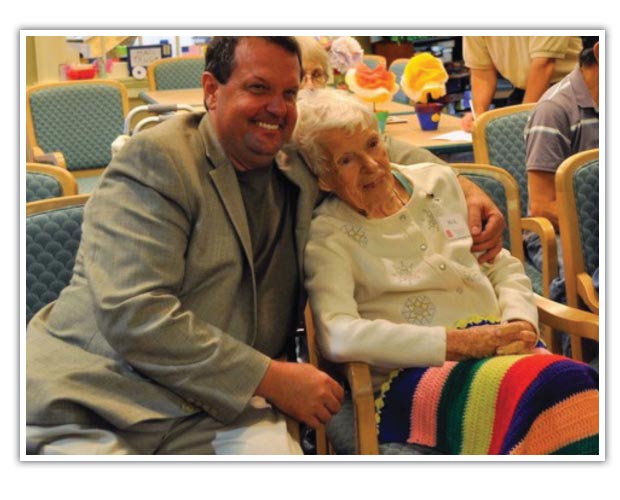The Alzheimer’s Poetry Project - By Nancy Squillacioti, Executive Director, Alzheimer Resource Center
 The Pabst Charitable Foundation for the Arts and the Edyth Bush Charitable Foundation recently joined together to bring a one-of-a-kind program to the Central Florida Community. The Alzheimer’s Poetry Project is the brainchild of professional poet Gary Glazner, who brought his concept to Orlando earlier in the year at the invitation of Margery Pabst. The Pabst Charitable Foundation for the Arts and the Edyth Bush Charitable Foundation recently joined together to bring a one-of-a-kind program to the Central Florida Community. The Alzheimer’s Poetry Project is the brainchild of professional poet Gary Glazner, who brought his concept to Orlando earlier in the year at the invitation of Margery Pabst.
Gary trained the staff of four different agencies on his poetry technique, whose goal is to facilitate the creativity of those suffering from Alzheimer’s and related dementias. The Alzheimer’s Poetry Project encourages participants to take an active role in the facilitator’s recitation of poems specially chosen for the group through a process Gary refers to as “call and response.” The facilitator uses poems to trigger memories and generate discussion among the group. Then a poem is developed by the participants as they respond to queries from Gary on a particular topic.
Four agencies – Easter Seals Adult Day-care, St. Mary Magdalen Adult Daycare, the Brain Fitness Club and the Alzheimer Resource Center- each presented the Alzheimer’s Poetry Project to groups of patients as they practiced the facilitating skills taught by Mr. Glazner. Many of the poems chosen by our agency, the Alzheimer Resource Center, were those made famous by Robert Frost.
We thought the readers of this newsletter might enjoy a fictional interview between Robert Frost and Nancy Squillacioti, the Executive Director of the Alzheimer Resource Center, on the Alzheimer’s Poetry Project.
Robert Frost: Tell me a little about the Alzheimer’s Poetry Project
Nancy: The Alzheimer’s Poetry Project utilizes well known poems that most people will recognize to spark conversation and fond memories with the participating Alzheimer’s patients. Most of us remember many of the songs and poems we learned as youngsters (think of Row, Row, Row Your Boat, for example) and the Poetry Project tries to trigger those memories by carefully selecting poems of interest to the group.
Robert Frost: What poems did you choose to present to your group?
Nancy: Actually, I chose several of your poems because they invoke such strong images of times long gone, perhaps, but full of happy memories. For example, in Stopping By the Woods On A Snowy Evening, you de-scribe a traveler heading home in a sleigh pulled by the family’s horse. As the snowflakes swirl around the author, the horse questions why he has stopped in the cold and snow. Although horses are rarely used for transportation anymore, several of the participants could recall those long-ago times and were also very familiar with the poem. The Frost poem called The Pasture discusses some of the chores that are part of a living on a farm, such as cleaning the pasture and bringing a newborn calf back to its shelter. Some of the attendees shared fond memories of their childhood on a farm or of visiting the farm of relatives.
Robert Frost: Why use poetry for this program?
Nancy: Poetry, like music or art, often triggers activity in portions of the brain that an Alzheimer’s patient may not utilize. Many poems of our youth were memorized and those memories can still be retrieved and enjoyed. Poetry is one of those activities that brings joy universally.
Robert Frost: What other poems did you share with the group?
Nancy: I utilized some of the writings from unknown poets on topics that are pretty universal, like celebrating New Year’s Eve or dressing children in hats, coats and gloves for a romp in the snow. William Wordsworth’s I Wandered Lonely As A Cloud, another highly recognized poem, generated fond reminiscences of swaying daffodils and puffy clouds racing across the sky.
Robert Frost: What plans do the agencies have for this project?
Nancy: The facilitators plan on bringing this program to other locations in the area and/ or to their day care clients on several occasions. Evaluations are completed by the staff reflecting the reactions and observations of the participants during the program. The purpose of
multiple presentations is to not only refine the program’s delivery but to help explore and gain knowledge from the behaviors observed by
the participants. The hope is that this program will lead to future interventions which will improve the quality of life for the participants.
Robert Frost: What do the participating agencies think is in the future for a pro-gram like the Alzheimer’s Poetry Project?
Nancy: The agencies and funders hope to help develop this program locally so that it can be used as a template for similar programs
in other areas.
Robert Frost: You can imagine that I’m quite fond of poetry, but I never thought about using it to help patients suffering from Alzheimer’s disease or related de-mentias. This is an exciting use of alter-native forms of therapy to enhance the quality of life for these special people. Thank you for sharing your thoughts with me.
Nancy: Thank you for the beautiful poems you have left for all of us to treasure.
|

